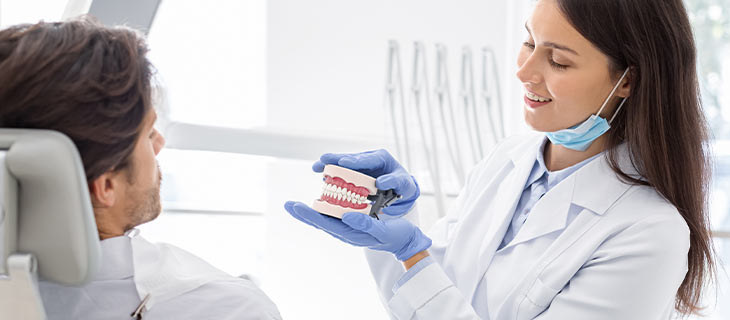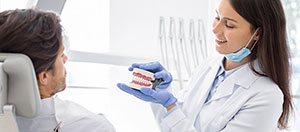Top Signs You Need Your Wisdom Teeth Removed
Wisdom teeth can often cause discomfort and complications if left untreated. If you’re noticing discomfort, swelling, or difficulty with your wisdom teeth, it might be time for a professional evaluation. Dr. Trinh Lee and Dr. Suzanna Lee at Allure Dental Center specialize in ensuring your oral health is in top shape. Our experienced team is ready to assess your situation and provide care. Contact us or book an appointment online today for a consultation. We are conveniently located at 570 N Shoreline Blvd Mountain View, CA 94043.


Table of Contents:
What are the common signs that indicate I need my wisdom teeth removed?
What kind of pain is typically associated with problematic wisdom teeth?
Can wisdom teeth affect my bite and overall oral function?
What is an impacted wisdom tooth?
How do providers at Allure Dental Center determine if your wisdom teeth need to be removed?
Various signs and symptoms may indicate the need for wisdom teeth removal. Among the most common signs that wisdom teeth may require removal is a persistent pain or feeling of discomfort at the back of the mouth.
This pain can result from the teeth pushing against neighboring molars or from an infection that arises when wisdom teeth partially erupt and create a space for bacteria to accumulate. Another indication is swelling or redness in the gums around the area where the wisdom teeth are located, which can signal inflammation or infection.
Some patients might also notice difficulty in opening their mouth fully or feel that their teeth are becoming misaligned as the wisdom teeth begin to crowd the other teeth.
Beyond pain and swelling, frequent headaches or jaw stiffness can also suggest that wisdom teeth are causing issues. In some cases, patients experience an unpleasant taste in their mouth or bad breath, both of which can indicate an infection.
Even if there isn’t noticeable pain, regular dental check-ups and X-rays can reveal whether the wisdom teeth are impacted or growing in at an angle, which might necessitate their removal to prevent future complications.
Pain from problematic wisdom teeth is typically felt in the back of the mouth and can vary in intensity. The discomfort often starts as a dull ache but can progress to sharp, throbbing pain if the teeth become infected or if they exert pressure on adjacent teeth.
This pain can radiate to the jaw, causing difficulty in chewing or talking. Additionally, the gums around the affected teeth may become tender or swollen, making it uncomfortable to brush or floss in that area.
In more severe cases, the pain may extend beyond the mouth, leading to headaches or even earaches as the surrounding nerves and muscles become irritated. If the wisdom teeth become impacted or are growing in at an awkward angle, the pain may persist or worsen over time, indicating that removal might be necessary.
Addressing this pain early on can prevent more serious issues and help patients to maintain their overall oral health.
Wisdom teeth can indeed impact an individual’s bite and overall oral function, particularly if they do not have enough space to emerge properly. When wisdom teeth begin to grow in at an angle or fail to fully erupt, they can push against neighboring teeth, causing them to shift out of alignment.
This shifting can alter the way the upper and lower teeth meet, leading to an improper bite, also known as malocclusion. An improper bite can cause difficulties in chewing, and speaking, and even lead to jaw pain or temporomandibular joint (TMJ) disorders.
Beyond affecting the bite, problematic wisdom teeth can also disrupt overall oral function. For example, they can make it more challenging to clean certain areas of the mouth effectively, increasing the risk of cavities or gum disease. If wisdom teeth are causing such complications, it may be necessary to remove them to restore proper alignment and preserve oral health.
Impacted wisdom teeth are teeth that are unable to develop or emerge normally due to inadequate space. This condition occurs when the wisdom teeth are blocked by other teeth or are growing at an angle that prevents the teeth from fully erupting through the gums.
Impacted teeth can remain trapped within the jawbone or partially emerge, leading to a host of potential problems. For instance, partially erupted wisdom teeth create a space where bacteria can easily accumulate, leading to infections, gum disease, and even cysts. In addition to the risk of infection, impacted wisdom teeth can exert pressure on surrounding teeth, causing pain, shifting teeth out of alignment, and damaging adjacent molars.
This pressure can also lead to swelling, jaw stiffness, and difficulty in opening the mouth. By maintaining oral health checkups patients become more likely to facilitate the early detection of wisdom teeth concerns.
If wisdom tooth removal is recommended, the specialists at Allure Dental Center can perform the procedure to alleviate pain and prevent further oral health issues.
Taking care of your wisdom teeth is an important step in maintaining a healthy and pain-free smile. Addressing any issues early can prevent potential complications and ensure your oral health remains in top condition. Allure Dental Center provides wisdom tooth removal. We offer personalized care to ensure your experience is as comfortable as possible.
At Allure Dental Center, Dr. Trinh Lee and Dr. Suzanna Lee evaluate your wisdom teeth to determine if removal is necessary. Common signs include pain, swelling, infection, or difficulty opening your mouth. If your wisdom teeth are causing misalignment, cavities, or are impacted (unable to fully emerge), removal may be recommended to prevent further issues.
Drs. Trinh and Suzanna Lee use advanced imaging to assess the position of your wisdom teeth and guide you through the best treatment options. At Allure Dental Center, patient comfort and care are always prioritized. Contact us or book an appointment online to take the first step toward a healthier smile. We are conveniently located at 570 N Shoreline Blvd Mountain View, CA 94043. We serve patients from Mountain View CA, Sunnyvale CA, Los Altos CA, Stanford CA, Menlo Park CA, Atherton CA, Loyola CA, Cupertino CA, Palo Alto CA, Redwood City CA, and surrounding areas.




